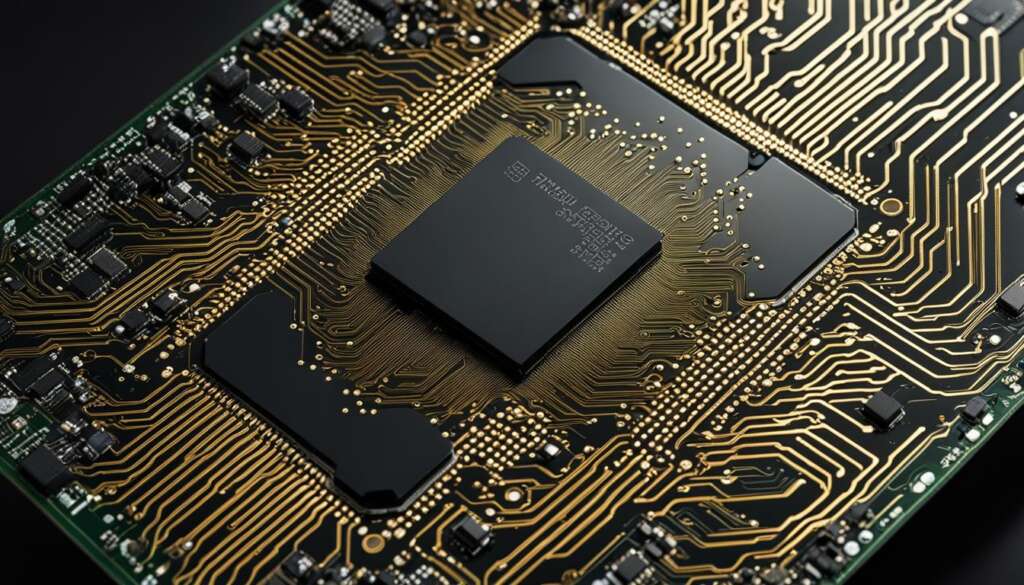Table of Contents
Welcome to our article on cybersecurity for smart cities, where we explore the digital security challenges faced by urban environments and the solutions available to protect them. As smart cities continue to evolve and grow, it becomes imperative to address the unique cybersecurity risks they face. Inadequate cybersecurity support for new technologies and the potential for false data manipulation are significant concerns that need to be mitigated.
Smart cities, with their interconnected systems and numerous entry points, require robust internet security measures. The integration of IoT devices and the dependence on advanced technologies like AI and automation raise the stakes even higher. Therefore, it is crucial to safeguard smart cities against cyber threats and protect critical infrastructure.
In this article, we will delve into the recent developments in smart city technology, examine the cybersecurity challenges faced by these cities, explore effective solutions, highlight IDB programs that enhance cybersecurity, discuss privacy concerns, and address overall challenges associated with smart cities. Finally, we will conclude with key takeaways and the importance of prioritizing cybersecurity to ensure a safe and secure urban future.
Recent Developments in Smart City Technology
Smart city technology is constantly evolving, with advancements in IoT devices, AI, automation, and 5G networks. These technological breakthroughs are reshaping urban environments, enhancing sustainability, streamlining resources, and improving the overall living experience for city dwellers.
The Internet of Things (IoT) has played a significant role in the development of smart cities. It involves the interconnectivity of various devices and sensors that collect and share data, enabling cities to make data-driven decisions and optimize their operations. From smart traffic management systems to automated waste management, IoT technology is revolutionizing the way cities function.
Artificial Intelligence (AI) is another crucial component of smart city technology. AI-powered systems can analyze vast amounts of data in real-time, providing valuable insights and enabling cities to respond quickly to various challenges. For example, AI algorithms can optimize energy usage in buildings, reduce traffic congestion, and improve emergency response times.
“The rapid development of smart city technology creates exciting opportunities for enhancing urban living. With IoT devices, AI-powered systems, and automation, cities can become more efficient, sustainable, and responsive to citizens’ needs.” – Smart City Expert
5G networks also play a vital role in smart city technology. The high-speed and low-latency capabilities of 5G enable the seamless transmission of data between devices, facilitating real-time communication and enabling applications such as self-driving cars and remote healthcare services. As 5G networks continue to expand globally, the potential for innovation and transformation in smart cities becomes even greater.
| Advancements in Smart City Technology | Benefits |
|---|---|
| IoT Devices | Optimized resource management Enhanced urban mobility Improved public safety |
| AI Systems | Data-driven decision-making Efficient energy usage Effective emergency response |
| 5G Networks | High-speed data transmission Real-time communication Enablement of innovative applications |
In conclusion, the rapid development of smart city technology, including IoT devices, AI systems, automation, and 5G networks, is revolutionizing urban living. These advancements offer numerous benefits, from optimized resource management to improved public safety. As smart city technology continues to evolve, we can expect even greater innovation and transformative impact in the future.
Cybersecurity Challenges Facing Smart Cities
Smart cities are not immune to cybersecurity challenges. As these cities embrace technology and connectivity to enhance urban experiences, they also become vulnerable to cyber threats. Securing IoT devices and protecting critical infrastructure are major concerns for smart city cybersecurity.
One of the main challenges is securing multiple entry points. With various devices and systems connected to the network, each entry point becomes a potential target for cyber attacks. Moreover, coordinating cybersecurity efforts among different departments and agencies is crucial to ensure a comprehensive and effective defense strategy.
The protection of critical infrastructure is another pressing issue. Smart cities rely on interconnected systems that control essential services such as energy distribution, transportation, and emergency response. Any disruption or compromise in these systems can have severe consequences for public safety and city operations.
| Cybersecurity Challenges | Smart Cities |
|---|---|
| Securing multiple entry points | Coordinating cybersecurity efforts among departments |
| Protecting critical infrastructure | Securing IoT devices |
Securing IoT devices is a critical aspect of smart city cybersecurity. These devices are interconnected and gather vast amounts of data, making them attractive targets for cybercriminals. Implementing robust security measures and encryption protocols is essential to prevent unauthorized access and manipulation of sensitive information.
To address these challenges, smart cities need to prioritize cybersecurity and invest in comprehensive defense strategies. Collaboration among government agencies, IT specialists, and cybersecurity experts is crucial to develop and implement effective security measures. By safeguarding IoT devices, protecting critical infrastructure, and enhancing coordination among departments, smart cities can build resilience against cyber threats.
Effective Solutions to Secure Smart Cities
Securing smart cities is a complex task that requires a multi-faceted approach. Here are some effective solutions to enhance cybersecurity in smart cities:
1. Secure IoT Devices
Smart cities rely on a vast network of interconnected IoT (Internet of Things) devices. To ensure their security, it is crucial to implement robust authentication and encryption protocols for each device. This helps protect against unauthorized access and potential data breaches. By securing individual IoT devices, the overall security of the smart city ecosystem can be significantly enhanced.
2. Public Awareness Campaigns
Raising public awareness about cybersecurity is essential for creating a cyber-aware culture among urban citizens. Through public awareness campaigns, citizens can be educated about potential cyber threats and trained on best practices to protect their personal data. Encouraging citizens to adopt strong passwords, enable two-factor authentication, and stay vigilant against phishing attempts can help mitigate cyber risks in smart cities.
3. AI-Powered Threat Detection
Deploying AI-powered threat detection systems can provide early recognition of possible cyber threats in smart cities. These systems use machine learning algorithms to analyze vast amounts of data and identify patterns indicative of suspicious activity. By leveraging AI technology, smart cities can proactively detect and mitigate cyber threats before they cause significant harm.
Overall, a combination of secure IoT devices, public awareness campaigns, and AI-powered threat detection systems can significantly enhance the cybersecurity of smart cities. It is essential for city governments, urban planners, and cybersecurity experts to collaborate and implement comprehensive strategies to ensure the privacy and security of smart city infrastructure and its citizens.

| Solutions | Benefits |
|---|---|
| Secure IoT Devices | Prevents unauthorized access and data breaches |
| Public Awareness Campaigns | Creates a cyber-aware culture and promotes best practices |
| AI-Powered Threat Detection | Proactively identifies and mitigates cyber threats |
IDB Programs to Enhance Cybersecurity in Your Smart City
The Institute for Defense and Business (IDB) offers a range of programs designed to enhance cybersecurity in smart cities. These programs provide valuable knowledge and skills to help city planners and stakeholders mitigate cyber risks and protect their digital infrastructure. By participating in these programs, cities can enhance their cybersecurity capabilities, ensuring a safe and secure environment for their citizens.
One of the flagship programs offered by the IDB is the IU-IDB Cyber Risk Management Program. This program focuses on teaching best practices and techniques to mitigate cyber risks in a digitized world. Participants gain a toolbox of cybersecurity best practices, develop confidence in working on cybersecurity solutions, and learn cutting-edge technology related to cybersecurity. Through hands-on exercises and real-world case studies, participants learn to identify vulnerabilities, respond to cyber incidents, and implement effective cybersecurity strategies tailored to the unique challenges of smart cities.
In addition to the IU-IDB Cyber Risk Management Program, the IDB also offers the LOGTECH Advanced program. This program aims to help organizations transform their approach to technology and innovation in logistics, providing tools and techniques to better manage potential threats. By understanding the cybersecurity landscape and implementing secure logistics and supply chain practices, cities can safeguard their critical infrastructure and protect against cyber threats.
| Program | Description |
|---|---|
| IU-IDB Cyber Risk Management Program | A program focused on teaching best practices and techniques to mitigate cyber risks in a digitized world. Participants gain a toolbox of cybersecurity best practices, develop confidence in working on cybersecurity solutions, and learn cutting-edge technology related to cybersecurity. |
| LOGTECH Advanced Program | A program that helps organizations transform their approach to technology and innovation in logistics, providing tools and techniques to better manage potential threats and secure critical infrastructure. |
These IDB programs offer a valuable opportunity for smart cities to enhance their cybersecurity capabilities and protect against evolving cyber threats. By equipping city planners, IT professionals, and cybersecurity experts with the necessary knowledge and skills, these programs contribute to the creation of secure and resilient smart cities that prioritize the safety and privacy of their citizens.
Cybersecurity and Privacy Concerns in Smart Cities
The increasing digitization of smart cities raises several cybersecurity and privacy concerns. As cities become more interconnected and reliant on technology, they become vulnerable to cyberattacks and data breaches. Cybercriminals can potentially disable critical infrastructure and exploit vulnerabilities in communication networks. Data breaches can lead to the exposure of sensitive information, identity theft, and financial fraud. These privacy concerns must be addressed to ensure the safety and security of smart cities and their residents.
In the context of smart cities, one of the major privacy concerns is the collection and use of personal data. Smart cities rely on the collection of large amounts of data from various sources, such as IoT devices, sensors, and surveillance cameras. This data can include personally identifiable information, which, if mishandled or accessed by unauthorized individuals, can result in privacy violations. Citizens may worry about their personal data being used for surveillance or targeted advertising without their consent.
Cyberattacks are another significant concern in smart cities. The interconnected nature of smart city systems means that a cyberattack on one component can have cascading effects on other systems and critical infrastructure. This can disrupt essential services and compromise public safety. For example, a cyberattack on a smart traffic management system could cause massive traffic gridlock, endangering lives and impeding emergency response efforts. Smart cities must therefore implement robust cybersecurity measures to prevent and mitigate cyberattacks.
Addressing these cybersecurity and privacy concerns requires a multi-faceted approach. Smart cities must develop comprehensive cybersecurity strategies that encompass secure network architectures, encryption of sensitive data, and regular security audits. Privacy-enhancing technologies, such as anonymization and data minimization techniques, should be implemented to protect the privacy of citizens. Access control measures and strong authentication protocols should be in place to limit unauthorized access to smart city systems. Furthermore, public awareness campaigns and education programs can empower citizens with the knowledge to protect themselves and understand their rights regarding privacy in smart cities.
Data Breaches in Smart Cities
“Data breaches in smart cities can have far-reaching consequences, impacting both individuals and the overall functioning of the city. It is crucial for smart cities to prioritize cybersecurity and invest in robust security measures to prevent data breaches and protect the privacy of citizens.”
Key Cybersecurity and Privacy Considerations in Smart Cities:
- Implementing robust cybersecurity measures to safeguard critical infrastructure and prevent cyberattacks.
- Ensuring the secure collection, storage, and transmission of personal data in compliance with privacy regulations.
- Educating citizens about their privacy rights and the steps they can take to protect their personal information.
- Regularly conducting security audits and vulnerability assessments to identify and address potential security risks.
- Utilizing privacy-enhancing technologies to anonymize and minimize the collection and use of personal data.
| Cybersecurity and Privacy Concerns | Solutions |
|---|---|
| Data breaches | Implementing robust cybersecurity measures, conducting security audits and vulnerability assessments, utilizing privacy-enhancing technologies |
| Unauthorized access to personal data | Ensuring secure collection, storage, and transmission of data, implementing access control measures and strong authentication protocols |
| Cyberattacks on critical infrastructure | Developing comprehensive cybersecurity strategies, securing network architectures, encrypting sensitive data |
Challenges Associated with Smart Cities
Implementing smart cities presents several challenges, such as the lack of infrastructure to support smart city operations and the inability to effectively process and analyze data.
The rapid advancement of smart city technology has resulted in the need for robust and reliable infrastructure to support the extensive network of connected devices and systems. However, many cities are facing challenges in upgrading their existing infrastructure or establishing new infrastructure to meet the demands of smart city operations. This includes the installation of sensors, communication networks, and data centers to enable seamless data exchange and analysis.
Furthermore, the enormous amount of data generated by smart city systems poses challenges in terms of data processing and analysis. Smart cities produce immense volumes of data from various sources, including sensors, IoT devices, and social media platforms. Processing and analyzing this data in real-time require advanced computing capabilities and efficient algorithms to derive meaningful insights.
The successful implementation of smart cities depends on overcoming these challenges and developing infrastructure and data processing capabilities that can support the ever-growing demands of a connected urban environment.
The Challenges of Smart City Infrastructure
Building the necessary infrastructure for smart cities is a complex task that involves multiple stakeholders, including city governments, urban planners, and technology providers. Challenges in smart city infrastructure include:
- Lack of funding: One of the major challenges is securing adequate funding for infrastructure development. Many cities face budget constraints and may struggle to allocate resources to support the implementation of smart city initiatives.
- Legacy systems: Existing infrastructure may not be compatible with smart city technologies, requiring significant upgrades and modifications.
- Interoperability: Ensuring that different systems and devices can communicate and work together seamlessly is another challenge. Interoperability standards need to be established to enable the integration of various smart city components.
Addressing these challenges requires collaborative efforts among stakeholders and the development of innovative financing models to support the implementation of smart city infrastructure.
The Data Processing Challenge
The abundance of data generated by smart city systems poses unique challenges in terms of processing and analysis. These challenges include:
- Scalability: Smart city systems produce massive amounts of data, requiring scalable data processing and storage infrastructure.
- Data integration: Combining data from various sources and formats can be complex and time-consuming. Ensuring data integrity and consistency is critical for accurate analysis.
- Real-time processing: Smart city applications often require real-time data processing to enable timely decision-making. Processing data in real-time introduces additional complexities and computational requirements.
Addressing these challenges involves adopting advanced data processing techniques, such as big data analytics, machine learning, and edge computing. These technologies can enable efficient data processing and analysis, allowing smart cities to derive actionable insights from the vast amount of data they generate.
| Challenges | Description |
|---|---|
| Lack of infrastructure | The existing infrastructure may not be sufficient to support the demands of smart city operations, requiring significant upgrades and investments. |
| Data processing | The large volume of data generated by smart city systems poses challenges in terms of storage, processing, and analysis. |
| Legacy systems | Existing infrastructure may not be compatible with smart city technologies, requiring modifications and integration efforts. |
| Interoperability | Ensuring seamless communication and integration among different smart city components is essential for efficient operations. |

Solutions for Smart City Challenges
In order to address the challenges associated with smart cities, city planners must prioritize cybersecurity and incorporate safety measures from the ground up. By implementing comprehensive cybersecurity strategies and utilizing privacy-enhancing technologies, smart cities can protect the sensitive data of their citizens and ensure their privacy. Cooperation among government bodies, urban planners, IT specialists, and cybersecurity experts is crucial for creating secure and efficient smart cities.
One key solution to enhance cybersecurity in smart cities is the adoption of strong encryption methods to protect data transmission and storage. This includes encrypting sensitive information such as personal data, financial records, and communication channels. By implementing end-to-end encryption, smart cities can ensure that the data exchanged within their networks remains secure and inaccessible to unauthorized individuals.
Another important solution is promoting interoperability among smart city applications and systems. This allows for seamless integration of different technologies and enables more efficient data sharing and analysis. By establishing common standards and protocols, interoperability can enhance the overall functionality and effectiveness of smart city initiatives. It also facilitates collaboration between different stakeholders and helps overcome the challenges associated with fragmented systems.
| Smart City Solutions | Cybersecurity | Privacy Protection | Interoperability |
|---|---|---|---|
| Implementing strong encryption methods | Securing data transmission and storage | Protecting sensitive information | Ensuring data sharing and analysis |
| Promoting public awareness | Raising cyber-awareness among citizens | Informing individuals about privacy rights | Encouraging collaboration and knowledge sharing |
| Utilizing AI-powered threat detection systems | Early recognition of possible threats | Real-time monitoring and response | Enhancing incident response and recovery |
In addition, public awareness campaigns play a crucial role in enhancing cybersecurity in smart cities. By educating citizens about cyber threats, best practices for online safety, and their privacy rights, cities can empower individuals to take an active role in protecting themselves and their data. This can be done through workshops, seminars, and online resources that promote cyber-awareness and encourage responsible digital behavior.
Lastly, the deployment of AI-powered threat detection systems can provide smart cities with early recognition of potential cyber threats. By leveraging artificial intelligence and machine learning algorithms, these systems can analyze vast amounts of data in real-time and identify anomalous behavior patterns indicative of cyber attacks. This enables cities to respond proactively, preventing or minimizing the impact of cyber incidents.
By implementing these solutions, smart cities can enhance their cybersecurity posture, protect the privacy of their citizens, and promote the secure and efficient operation of their digital infrastructure. With the collaboration of various stakeholders and the adoption of best practices, smart cities can navigate the challenges associated with cybersecurity and create a safer and more resilient urban future.
Conclusion
As smart cities continue to evolve, it is critical to prioritize cybersecurity to protect against cyber threats. The rapid advancement of smart city technology brings both benefits and challenges. By implementing effective cybersecurity solutions, securing IoT devices, raising public awareness, and utilizing AI-powered threat detection systems, smart cities can enhance their security and ensure the privacy of their citizens. Cooperation among government bodies, urban planners, IT specialists, and cybersecurity experts is essential for safeguarding smart cities and creating a safer urban future.
In summary, smart cities face unique cybersecurity challenges, including securing multiple entry points, coordinating among departments, and protecting critical infrastructure. However, there are effective solutions available, such as securing individual IoT devices, implementing public awareness campaigns, and deploying AI-powered threat detection systems. It is crucial to protect individual IoT devices and create a strong network of interconnected and highly protected devices. Public awareness campaigns and education programs play a crucial role in nurturing a cyber-aware culture among urban citizens. Deploying AI-powered threat detection systems provides early recognition of possible threats and suggestions for mitigating them. Implementing comprehensive cybersecurity strategies, privacy-enhancing technologies, and encryption of sensitive data are also effective solutions.
In conclusion, as the market for smart cities continues to grow, it becomes imperative to protect them against cyber threats. By taking proactive measures and prioritizing cybersecurity, smart cities can effectively address the challenges and ensure a secure and efficient urban future. With the cooperation and expertise of government bodies, urban planners, IT specialists, and cybersecurity experts, smart cities can thrive while maintaining the privacy and security of their citizens.
FAQ
What are the main cybersecurity challenges facing smart cities?
The main challenges include securing multiple entry points, coordinating among departments, and protecting critical infrastructure.
What are some effective solutions to secure smart cities?
Effective solutions include securing individual IoT devices, implementing public awareness campaigns, and deploying AI-powered threat detection systems.
How can individual IoT devices be secured?
Individual IoT devices can be secured through secure verification options, multi-factor authentication, and encryption.
What is the importance of public awareness campaigns in smart cities?
Public awareness campaigns are essential for nurturing a cyber-aware culture among urban citizens and promoting cybersecurity best practices.
What benefits can AI-powered threat detection systems provide?
AI-powered threat detection systems can provide early recognition of possible threats and suggestions for mitigating them.
What programs does the Institute for Defense and Business offer to enhance cybersecurity in smart cities?
The Institute for Defense and Business offers the IU-IDB Cyber Risk Management Program and the LOGTECH Advanced program to enhance cybersecurity in smart cities.
What are the cybersecurity and privacy concerns in smart cities?
Concerns include potential cyber attacks on critical infrastructure, data breaches, and the misuse of surveillance cameras.
What challenges are associated with smart cities?
Challenges include the lack of infrastructure to support smart city operations and the need for global standards and interoperability among smart city applications and systems.
How can smart city challenges be addressed?
Smart city challenges can be addressed through proactive planning, partnerships with cybersecurity experts, and the development of comprehensive cybersecurity strategies.
Source Links
- https://www.idb.org/what-are-the-cybersecurity-risks-for-smart-cities/
- https://cybersecurity.att.com/blogs/security-essentials/securing-the-smart-cities-of-tomorrow-cybersecurity-challenges-and-solutions
- https://thrivedx.com/resources/article/cybersecurity-smart-cities-solutions







